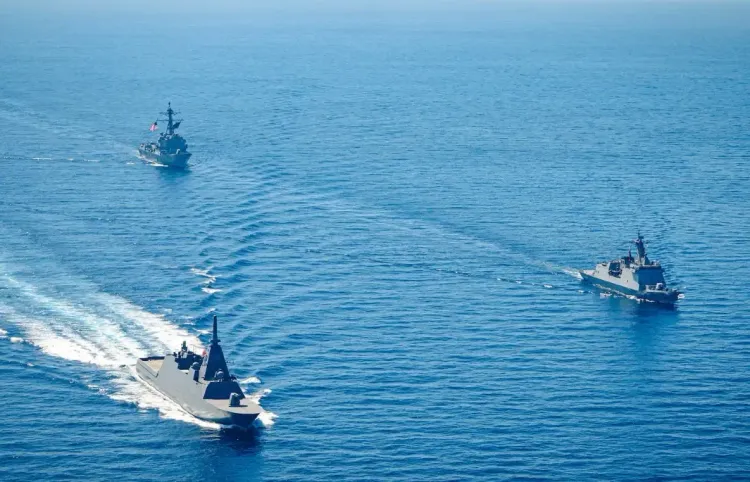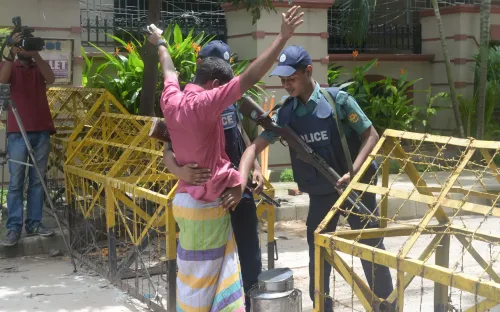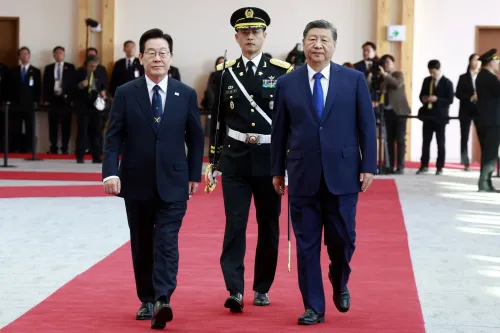Joint Military Exercises by Philippines, US, and Japan in Contested South China Sea

Synopsis
Key Takeaways
- Philippines, Japan, and US conducted joint military drills.
- Exercises aimed at enhancing maritime security cooperation.
- Concerns over China's assertiveness in the South China Sea.
- Commitment to a rules-based international order reaffirmed.
- Strengthening alliances is vital for regional peace.
Manila, March 29 (NationPress) The Philippines, Japan, and the United States executed a multilateral Maritime Cooperative Activity (MCA) within the Philippines' Exclusive Economic Zone, showcasing a united effort to enhance regional and international collaboration in support of a free and open Indo-Pacific.
This maritime initiative took place on Friday amidst escalating threats and the increasing assertiveness of China in the area, as reported by various media outlets.
MCAs are carried out in accordance with international law and with respect for the safety and navigational rights and freedoms of all nations.
The US, alongside its allies and partners, maintains the right to freedom of navigation and overflight, as well as other internationally lawful uses of the sea related to freedom, according to an official statement from the US Navy.
The Armed Forces of the Philippines (AFP) emphasized that the multilateral MCA consistently underscores the essential advancements in coordination, tactics, and shared maritime awareness, as reported by the state-run Philippine news agency PNA.
"Each iteration enhances our capability to address maritime security challenges while reinforcing our collective strength to protect our national interests," stated the armed forces.
The Embassy of Tokyo in the Philippines remarked that by collaborating with "like-minded partners," Japan reaffirms strategic partnerships and promotes cooperation in ensuring the free and open use of the seas.
"Standing together, Japan, the Philippines, and the United States are steadfast in advancing the shared vision of a Free and Open Indo-Pacific, reaffirming their commitment to a rules-based international order that fosters peace, security, and prosperity for all nations in the region," the statement declared.
Moreover, during the visit of US Defense Secretary Pete Hegseth to the Philippines, President Ferdinand R. Marcos Jr. acknowledged the United States' vital role as the "greatest force" in preserving peace in the Indo-Pacific region, particularly in the South China Sea.
Marcos indicated that Hegseth's visit conveys a "very strong" message of Manila and Washington's dedication to fortifying their alliance.
In February, the Philippines Coast Guard denounced "dangerous" maneuvers by a Chinese Navy helicopter that approached within three meters (10 feet) of a surveillance flight carrying journalists over the disputed Scarborough Shoal in the South China Sea.
Last December, during the Japan-US-Philippines Maritime Dialogue in Tokyo, leaders confirmed their commitment to enhancing cooperation among the three nations as natural partners and maritime nations connected by the Pacific Ocean.
They discussed recent developments in the South China Sea and reiterated their opposition to any unilateral attempts to alter the status quo by force.
They also agreed to deepen maritime cooperation to achieve a free and open Indo-Pacific grounded in the rule of law, according to the Japanese Ministry of Foreign Affairs.
Recently, the Foreign Ministers of the Group of 7 (G7) countries criticized China's dangerous maneuvers in the South China Sea during their meeting in Quebec, Canada.
The Joint Statement from the G7 Foreign Ministers' Meeting reiterated their commitment to maintaining a free, open, prosperous, and secure Indo-Pacific based on sovereignty, territorial integrity, peaceful dispute resolution, fundamental freedoms, and human rights.
They condemned China's "militarization and coercion" and opposed any unilateral attempts to alter the status quo, especially through force and coercion.









